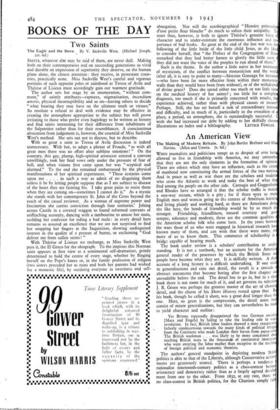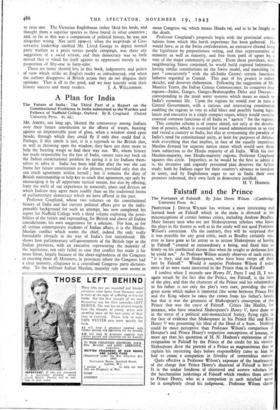An American View
WHEN journalists and politicians tempt us to despair of ever bei allowed to live in friendship with America, we may remembe that they are not the only elements in the formation of opinio There are others which may have an influence, such as the cr of manhood now constituting the armed forces of the two nation And in peace as well as war there are the scholars and studen who cross the Atlantic to work and make the best of what the find among the people on the other side. Carnegie and Guggenhe. and Rhodes have so arranged it that the scholar traffic is maini a one-way stream, which is a pity ; for if there were as man English men and wom;:in going to the centres of American leamin and living plainly and working hard, as there are Americans doin the like here, the bonds of friendship would be by so much th stronger. Friendship, friendliness, natural courtesy and goo temper, tolerance and modesty, these are the common qualities the American scholar folk who come here. In the years betw the wars those of us who were engaged in historical research hat known many of them, and can wish that there were more, an more of us to know them. This commerce of scholarship is bridge capable of bearing much. The book under review is a scholars' contribution to und standing. It is not a textbook, but an account for the America general reader of the processes by which the British State an people have become what they are. It is skilfully written. A sho account of a long history is a difficult undertaking. If one stic to generalisations and cuts out detail, the result is a cascade abstract statements that become boring after the first chapter an unreadable before the end. The detail ,has to go in, but in a sho book there is not room for much of it, and art governs its select" J. R. Green was perhaps the greatest master of the art of choosi detail, and the charm of his Short History rested upon that. B• his book, though he called it short, was a great deal longer than th one. Here, so great is the compression, the detail must it consist of minor generalisations, but they can nevertheless be mad to yield character and outline: Yet Britons repeatedly disappointed the two German socialis [Marx and Engels] by failing to take the leading role in wor revolution. In fact, British labor leaders showed a most exasperaur • fatherly condescension towards the many kinds of political refuge from the Continent who made London their haven from persecum The British workman . . . was likely to be more concerned abo teaching British ways to the thousandi of continental immigran who were entering the labor market than receptive to the teachin of foreign political and economic theorists.
The authors' general standpoint in depicting modern Brit's politics is akin to that of the Liberals although Conservative achiet ments are generously treated. There is perhaps a tendency rationalise nineteenth-century politics as a class-contest betw aristocracy and democracy rather than as a largely agreed develo ment from one to the other. From 1832, at any rate, there no class-contest in British politics, for the Chartists .simply fail to raise one. The Victorian Englishman rather liked his lords, and thought them. a superior species to those found in other countries ; and, so far as this was a comparison of political bosses, he was not altogether wrong. Not until r000-It, when the ineptitude of Con- servative leadership enabled Mr. Lloyd George to depict normal party warfare as a peers versus people campaign, was there any suggestion of a _social schism, and then democracy was so little moved that voted for itself against its oppressors merely in the proportion of fifty-one to forty-nine.
There are many shrewd hits in this book, judgements and points of view which strike an English reader as unhackneyed, 2nd when the authors disapprove of British action they do not disguise their opinions. That is all to the good, and we may heartily wish their history success and many readers. J. A. WILLIAMSON.



























 Previous page
Previous page